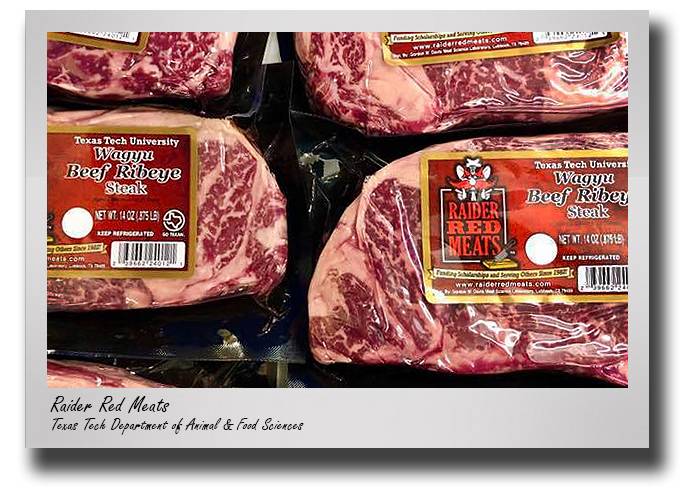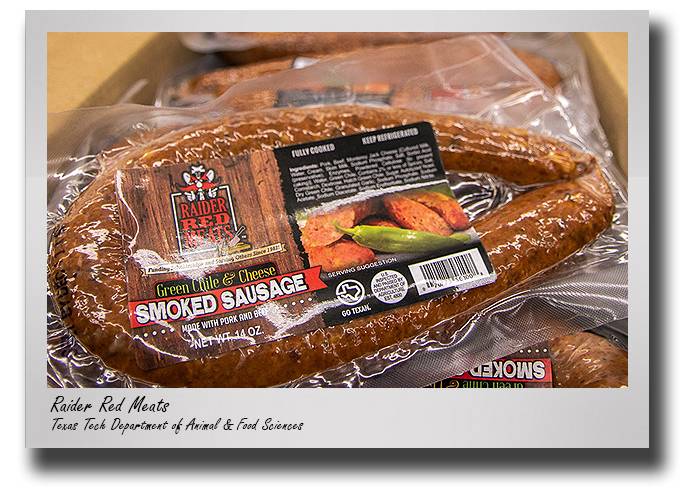COVID-19: Raider Red Meats provides opportunity to engage CASNR students
By: George Watson
 In mid-March, buildings on the Texas Tech University campus shuttered their doors,
and faculty, staff and students were sent home to complete the semester online as
a result of the COVID-19 pandemic that has gripped the entire world.
In mid-March, buildings on the Texas Tech University campus shuttered their doors,
and faculty, staff and students were sent home to complete the semester online as
a result of the COVID-19 pandemic that has gripped the entire world.
But as campus administrators and state and local officials began to deal with the coronavirus outbreak, one part of campus has been able to maintain some sense of hands-on learning. That's because the service it provides has been deemed essential for the population to survive.
 Raider Red Meats, the retail aspect of the Department of Animal & Food Sciences in
the Texas Tech College of Agricultural Sciences & Natural Resources, continues to
supply consumers with quality meat products, from ground beef to pork and lamb. Their
ability to ship meat has allowed a handful of students to stay on campus to help process
meat and fill orders.
Raider Red Meats, the retail aspect of the Department of Animal & Food Sciences in
the Texas Tech College of Agricultural Sciences & Natural Resources, continues to
supply consumers with quality meat products, from ground beef to pork and lamb. Their
ability to ship meat has allowed a handful of students to stay on campus to help process
meat and fill orders.
"We use students for most of our operations, and without them, we would not be able to operate very efficiently," said Raider Red Meats Director Tate Corliss. "We are open for experiential learning outcomes for our students. Our store has been closed on campus, but we have continued to serve businesses in Lubbock and meet online orders, shipping orders daily through Federal Express."
Raider Red Meats has always served as not only a retail business, but a way for students to gain real-world experience in preparing, packaging and selling meat. Though the restaurant/store is closed due to the pandemic, the work continues.
Initial Surge
Prior to the closing of non-essential businesses, the transition for students and faculty to online classes and the governmental orders to stay home when at all possible, Raider Red Meats experienced a tremendous surge.
As reports of grocery hoarding began to surface and retail grocers across the United States began to experience shortages of products, Raider Red Meats saw a sudden surge in business as people sought alternative stores for their beef, pork and poultry needs. Corliss said Raider Red Meats was experiencing record sales until the on-campus store was forced to close.
"When shutdowns began to arise and food demand skyrocketed, we honestly didn't have enough employees to meet demand," said Koby Valentine, a senior animal sciences major from Clovis, New Mexico. "The week of spring break I was working all day just to keep up with daily sales, and it was like nothing I had witnessed in eight semesters of working there."
The increased demand also caught Raider Red Meats, like others, by surprise just a bit in what exactly the public was looking for. For example, Valentine said that during the week of spring break, Raider Red Meats ran out of ground beef, which he said never happens. He said he processed more than 500 pounds of ground beef in one morning, and that allotment sold out in about two hours later that day.
Raider Red Meats tried its best to keep up with demand, but the initial surge overwhelmed them at first, just like it did everyone else.
"During the first few weeks before our store was closed, my co-workers and I physically couldn't keep the shelves stocked fast enough," said Shae Suttle, a sophomore animal sciences major from Idalou. "People came in panic-buying and hoarding hot items, including ground beef and chuck roasts."
 Different Demand
Different Demand
Suttle added, though, that since people have settled into a stay-at-home routine, Raider Red Meats has been able to get into a groove and keep up with the demand for products online. It has also been able to service its partners, including United Supermarkets, The Bent Nail, Honey Glazed Ham and the Outdoor Chef, to make a few.
Interestingly there has been a change in purchasing habits. According to Corliss, as a Go Texan member that supports agriculture, Raider Red Meats gets its products from local and regional sources. Some of its supply also comes from the college's industry partners, such as Cargill and Tyson as well as from animals harvested locally.
While the quality of meat remains the same, what the public is looking to buy has changed dramatically. Corliss said demand for ground beef, stew meat and beef roasts has increased and Raider Red Meats has shifted production to those kinds of cuts in order to meet demand.
"People are more interested in easy and flexible options, including ground beef, as opposed to our high-quality steaks," Suttle said. "Typically, grilling season begins as the weather starts to warm up, and usually around this time of year we see a spike in steak sales, including ribeyes, New York strip steaks and tenderloins. However, this pandemic has led to an adjustment in the choice of meat, resulting in a higher demand for lower-quality items."
Corliss noted that although Raider Red Meats can stay open in its current format as long as is needed with their current processing conditions, they are ready to serve their customers again, even if it is curbside while the university's buildings remain closed.
CONTACT: Michael Orth, chairman, Department of Animal and Food Sciences, Texas Tech University at (806) 834-5653 or michael.orth@ttu.edu
0430NM20 / For the full text version of George Watson's Texas Tech University Office of Communications & Marketing news article, please click here
Davis College NewsCenter
-
Address
P.O. Box 42123, Lubbock, Texas 79409-2123, Dean's Office Location:Goddard Building, Room 108 -
Phone
(806)742-2808 -
Email
kris.allen@ttu.edu
